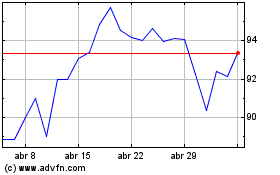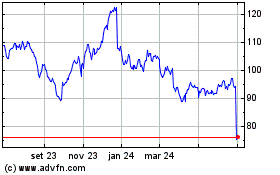Will the S&P 500 Index Touch a New 52-Week Low?
25 Setembro 2022 - 6:20PM
Finscreener.org
The equity markets in the United
States tumbled yet again in the week that ended on September 23,
2022. The
Dow Jones Industrial Average index briefly entered the bear market territory
and closed at a new low as investors remain concerned over the
prospect of an upcoming recession as the Federal Bank
raised interest rates
by 75% to curb inflation.
In the last week, the Dow fell
4%, while the
S&P 500 and
Nasdaq contracted by 4.7% and 5%,
respectively.
Treasury yields also rose to
their highest levels since 2008. The yield curve inversion deepened
as the 2-year Treasury note increased by over 4.2%, which is a sign
of investor pessimism regarding the health of the economy in the
near term.
Oil prices too cooled down on
Friday due to a strong U.S. dollar and recession fears. The U.S.
dollar rose to multi-decade highs against the British Pound and
euro, startling global investors. The prices for the WTI or West
Texas Intermediate fell 5% to $79 per barrel, which was its lowest
level since January.
The next week is the final week
of Q3, as well as September, which has historically been the worst
month for stock market investors. It has so far been the fifth
worst start of a year for the equity markets in the U.S.
Earnings and macro news to drive the S&P 500 this
week
In the upcoming week, several
companies such as Nike (NYSE: NKE),
Micron Technology (NASDAQ:
MU), Bed Bath &
Beyond (NASDAQ:
BBBY), and Carnival Corp.
(NYSE:
CCL) will report their
quarterly earnings.
On Tuesday, the S&P 500
will report the Case-Shiller Home Price Index, which will track
home prices. Housing price growth is expected to have decelerated
in July after rising 0.4% in June, which was the slowest growth in
two years. Home price growth peaked in March and has slowed due to
rising bond yields.
The 30-Year mortgage rates just
hit 6.7%, more than double compared to the year-ago period and the
highest levels since 2008. The velocity of the recent move in
rates is pretty spectacular. Jerome Powell couldn’t have been more
explicit during his recent speech: “The housing market may have to
go through a correction,” which is a kiss of death for the housing
market.
Some key observations
include:
- US real estate affordability
dropped violently, it has reached levels not seen since the
1980s
- Buyers purchasing a $500,000
house today, compared to last year, will pay a minimum of $265,000
more in interest alone and a 100% increase in the monthly
payment.
- In August, 37.6% of homes in
the U.S. sold below the list price
- Luxury home purchases have sunk
28% - the most on record
- Home-flipper
Opendoor (NASDAQ:
OPEN) lost money on 42% of the properties it sold in
August
Why should you watch real estate
closely?
Global real estate is the largest
asset class in the world, representing upwards of $300 trillion.
This is 3x fixed income and equities at ~$100 trillion.
The slowdown we are seeing in
real estate prices will reduce demand for other assets such as
equities and fixed income via the wealth effect. This, of course,
is in addition to the inflation everyone is facing.
With mortgage payments rising
dramatically. Buyers who overpaid for houses they couldn’t afford
in 2020/2021 (when rates were low) are now feeling the pain, and
this will have knock-on repercussions across financial
markets.
Consumer confidence
reports
The Conference Board will also
release the September update for its CCI or Consumer Confidence
reports. It measures consumer optimism with regard to their
personal finances and the state of the economy.
Estimates project an increase in
confidence from 103.2 in August to 104 in September. Economists
also expect the Consumer Sentiment Index to read 59.5, compared to
58.2 in August, due to lower gas prices and moderating inflation
numbers.
Nike (NYSE:NKE)
Gráfico Histórico do Ativo
De Mar 2024 até Abr 2024

Nike (NYSE:NKE)
Gráfico Histórico do Ativo
De Abr 2023 até Abr 2024
